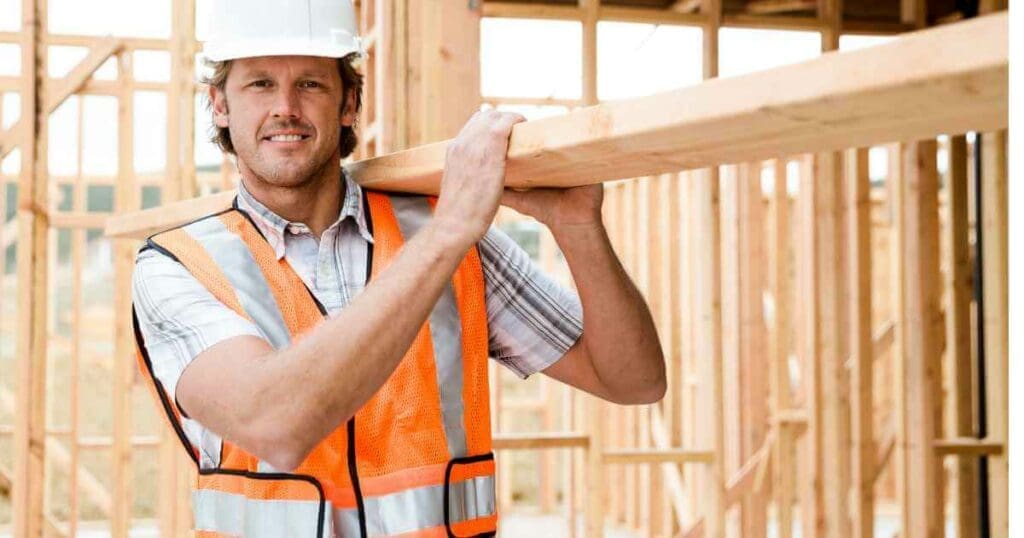What should a construction worker put on a resume? This is a common question for many individuals seeking employment in the construction industry. Creating a compelling resume as a construction worker can be daunting, particularly if you’re new to the job market or have limited experience in the industry. It can be challenging to determine what information to include and how to present it in a way that highlights your strengths and experiences.
At MatchBuilt, we understand these challenges and the importance of a well-crafted resume in securing your next construction job. This blog post provides valuable tips and insights on creating a standout construction worker resume, including key elements, best practices for showcasing your skills and experience, and expert advice on impressing potential employers.
We will cover the type of work experience that impresses employers, the certifications and qualifications that make you stand out, how to list your skills effectively, and other important information that can make your resume shine.
Showcase Specialized Skills and Experience
As a construction worker, your skills and experience are incredibly valuable to potential employers. Here are some examples of specialized skills and knowledge that you should consider highlighting on your resume:
- Experience with specific types of construction projects (e.g., high-rise buildings, bridges, tunnels, etc.)
- Knowledge of specialized tools and equipment (e.g., cranes, backhoes, bulldozers, etc.)
- Proficiency in specific construction techniques (e.g., welding, carpentry, masonry, etc.)
- Experience with project management and coordination (e.g., overseeing teams of workers, managing timelines and budgets, etc.)
- Expertise in reading and interpreting blueprints and schematics
- Experience with building codes and regulations
- Ability to work at heights or in confined spaces
- Experience with hazardous materials handling and disposal
Highlight Certifications and Qualifications
In addition to specialized skills and experience, employers also value certifications and qualifications in construction workers. Here are some of the certifications and capabilities that you should consider adding to your resume:
- OSHA 10 or 30 certifications for construction safety
- NCCER certification for specific construction trades (e.g., carpentry, plumbing, electrical, etc.)
- Certification in heavy equipment operation (e.g., cranes, forklifts, backhoes, etc.)
- Certification in welding or other specialized techniques
- Licensure as a general contractor or trade contractor
- First Aid and CPR certification
Tips for Effectively Showcasing Skills and Experience on a Resume
Once you have identified your specialized skills and qualifications, it’s essential to showcase them effectively on your resume. Here are some tips to help you do so:
- Use action verbs to describe your accomplishments (e.g., “Built,” “Managed,” “Supervised,” etc.)
- Quantify your experience with specific metrics (e.g., “Managed a team of 10 workers,” “Completed a project under budget by 15%, etc.)
- Highlight the experience that is most relevant to the job you’re applying for
- Use bullet points to break up your resume into easily scannable sections
20 Skills to Add to Your Construction Worker Resume
If you’re not sure where to start when it comes to identifying your skills and experience, here are 20 skills that you should consider adding to your construction worker resume:
- Blueprint interpretation
- Hazardous materials handling and disposal
- Heavy equipment operation
- Carpentry
- Welding
- Concrete pouring and finishing
- Masonry
- Electrical work
- Plumbing
- Roofing
- Drywall installation and finishing
- Flooring installation
- Painting
- HVAC installation and repair
- Project management
- Team management and leadership
- Time management
- Budget management
- Communication skills
- Problem-solving skills
Insights into the Construction Industry Job Market
Understanding the broader context in which you apply for construction jobs is essential. Here are some insights into the current state of the construction industry job market:
- According to the U.S. Bureau of Labor Statistics, job availability in the construction industry is expected to grow by 5% between 2021 and 2029.
- The construction industry is still recovering from the COVID-19 pandemic, which caused a temporary slowdown in construction projects in 2020. However, the industry is expected to rebound in the coming years as the economy recovers.
- Many construction companies struggle to find skilled workers to fill open positions, which means more job opportunities may exist for qualified and experienced construction workers.
- The construction industry is increasingly incorporating new technologies and techniques, such as Building Information Modeling (BIM) and prefabrication, which may require workers to develop new skills and adapt to new working methods.
- Finally, the construction industry is highly competitive, meaning having a strong resume and showcasing your skills and experience effectively can make all the difference in getting hired for your next job.
Frequently Asked Questions About Construction Worker Resumes
Here are some common questions about what construction workers should include on their resumes to make them stand out in a competitive job market. Whether you’re a seasoned pro or just starting out in the industry, we’ll help you create a winning resume that highlights your strengths and sets you apart from other candidates.
Your construction worker resume should include your work experience, skills, education, and any relevant certifications or qualifications for the job you're applying for. You should also include any relevant accomplishments or projects you've worked on.
Your construction worker resume should be one to two pages long, depending on your experience level. If you have many years of experience, you may need to expand your resume to two pages to include all of your relevant experience.
Some skills to include on your construction worker resume are the ability to read blueprints and plans, experience with heavy machinery and tools, knowledge of building codes and regulations, and experience working on construction projects.
Some certifications and qualifications to include on your construction worker resume are OSHA certification, construction safety certification, equipment operation certification, and relevant trade certifications.
Your construction worker resume should be organized in a clear and easy-to-read format. Use headings and bullet points to break up information and make it easy to skim. Ensure your contact information is prominently displayed at the top of your resume.
Yes, you should always include a cover letter with your construction worker resume. Your cover letter is an opportunity to introduce yourself and highlight your qualifications and interest in the job you're applying for.
To make your construction worker resume stand out, be sure to highlight your specialized skills and experience, showcase any relevant accomplishments or projects, and use specific and quantifiable examples to demonstrate your impact in previous roles.
Some common mistakes to avoid on your construction worker resume are spelling and grammatical errors, using a generic resume template, including irrelevant information, and failing to tailor your resume to the specific job you're applying for.
Crafting a Standout Construction Worker Resume: Final Thoughts
Crafting a strong construction worker resume is essential for landing your next job in the industry. By highlighting your skills, experience, and qualifications and tailoring your resume to the specific job you’re applying for, you can stand out from other applicants and increase your chances of landing your dream job.
At MatchBuilt, we understand the importance of a well-crafted resume in the construction industry. As a leading recruitment firm specializing in the construction industry, we work with both employers and job seekers to help match suitable candidates with the correct positions. Whether you’re looking for a job or looking to hire, our team of experienced recruiters is here to help. Contact us today to learn more about our services and how we can help you achieve your career goals in the construction industry.



